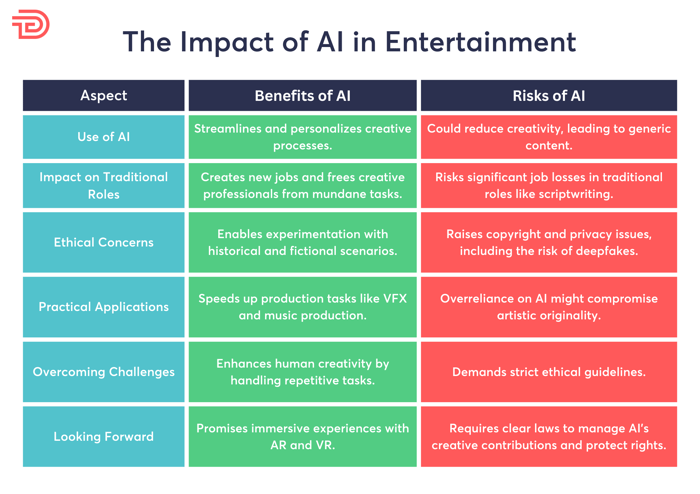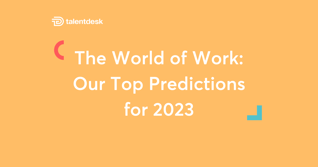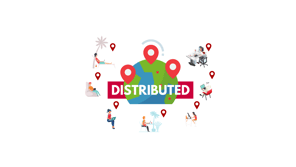Revolution or Disruption? The impact of AI in Entertainment & Media
- 14 May 2024
- 9 mins read
- Posted in
Contents:
- FAQ
- The Use of AI in Entertainment
- The Impact of AI on Traditional Roles
- Ethical Concerns in the Entertainment Industry
- Practical Applications of AI in the Industry
- Overcoming Challenges with AI in Entertainment
- Looking Forward at The Future of AI
- Working with Industry Professionals
- Anticipating the AI Disruption
FAQ:
- What new roles is AI creating in the entertainment industry?
AI is generating jobs for analysts, developers, and legal experts in entertainment. - What are the ethical concerns with using AI in entertainment?
Key concerns include copyright issues, privacy, and the authenticity of AI-generated content. - What are the benefits of AI in filmmaking and music production?
AI speeds up effects creation and enhances sound quality, reducing production time. - How can AI impact marketing in the entertainment industry?
AI performs sentiment analysis on social media, helping tailor marketing strategies.
Fans of old movies and 50s Hollywood glamor will be thrilled to know that James Dean has a new movie coming out! Yes, we’re talking about that James Dean – the Hollywood heartthrob who passed away in a tragic accident in 1955. Yet, thanks to new innovations in Generative AI, the actor is now being resurrected to star opposite current actors.
This just scratches the surface of what AI is capable of doing today. Indeed, AI innovations are completely transforming the entertainment industry. There’s immense potential in what’s possible – but of course, it raises a slew of concerns as well.
After all, if we have come to a point where avatars of dead actors can be created to star in an entire movie, what’s to stop people from using similar AI generated synthetic media to recreate virtually any public figure today – and get them to say or do anything? So let us take a deeper look at what AI can do, and the positive and negative impact it’s having in the entertainment space.
The Use of AI in Entertainment
How AI Tools are Enhancing Creativity
AI tools offer indisputable advantages – and creators everywhere are already using them to streamline their workflows and make tedious tasks easier.
Location scouting and visualization, for example, are highly effort-intensive tasks that tools like Luma AI are making infinitely easier. A filmmaker can simply upload a quick location video and use the tool to create photorealistic models for 3D visualization.
Similarly, they now no longer need to spend hours going through endless scripts. Tools like ScriptBook can read entire scripts in mere seconds, analyze it to identify the patterns and narratives within it and ascribe parameters to define the story. It can even accurately predict how well each script will do in terms of commercial success!
Animators and VFX experts are using Autodesk’s Maya to create time-consuming, complicated effects like water or fire in seconds. Production artists are using Adobe Sensei’s AI capabilities to ease post production video editing tasks like color grading, cut detection and more. All of these take the mundane tasks off creators’ plates so they can do what they do best – reimagine new experiences for audiences.
AI's Role in Personalizing Entertainment Experiences
Aside from enhancing the creative side of the industry, AI also plays a key role in the distribution and marketing sides of the entertainment business. Streaming platforms are a prime example. They use AI algorithms to track and monitor users’ preferences, and recommend personalized suggestions.
Now, Natural Language Processing (NLP) tools are also being used to generate insights for marketing and PR. These tools can monitor the buzz on social media to conduct sentiment analysis and tell producers how audiences are reacting to certain content. It can help raise red flags early on, so producers can update their strategies accordingly. Personalized data can also be leveraged to generate customized ads for individual audience groups.
The Impact of AI on Traditional Roles
The impact of AI on jobs is a major concern for professionals everywhere. With so many tasks being automated, the role of human experts is fast evolving.
Opportunities for New Job Creation
On a positive note, AI innovations becoming more mainstream in the entertainment industry is giving rise to brand new job opportunities. For example, with creators adopting more AI storytelling tools, there will be an increased demand for analysts to assess and refine the content, to ensure that storylines flow in a natural and human way.
Likewise, there will be a huge demand for developers to create user-friendly Generative AI algorithms that work to cater to various entertainment functions. Subsequently, this will spark off new demand for legal and ethical experts to oversee copyright contracts, and uphold Responsible AI guidelines.
A lot of this demand is already becoming apparent. In the second quarter of 2023, Upwork recorded a whopping 1000% increase in AI jobs posted on its platform.
Potential Risks of Job Displacement
However, there is a risk of job displacements too. One report predicted that 62,000 jobs in the California entertainment industry alone will be impacted due to AI. In fact, of all the companies surveyed, 75% reported that AI is already reducing or eliminating job roles in their division.
Functions like 3D modeling, character design, sound editing, music editing and scriptwriting were found to be particularly vulnerable to displacement, with AI tools now able to perform these tasks at a fraction of the time and effort. With this generating immense cost savings, it is expected that studios and production houses are likely to want to use these advantages, leaving thousands of jobs at risk – particularly at the entry-level. What’s most concerning is that the junior workers who are displaced may not be the same ones who will be able to take on the new, advanced roles that open up.
Ethical Concerns in the Entertainment Industry
Navigating Copyright and Creativity Issues
Aside from job risks, there’s also been a lot of buzz around legal and creativity concerns surrounding AI within the entertainment industry.
AI models are trained by using copyrighted data on the internet, which in itself can amount to intellectual property theft. But that’s not where it ends. Having learned from current artists’ work, AI software can then go ahead and create new work that looks, reads or sounds exactly like the artists it learned from.
For example, today, it is possible for an AI-driven music generation software to trawl through YouTube, consume audio files and then use them to repurpose and recreate new songs on any given topic, that sounds exactly like a particular artist.
This prompts questions around how copyrights will be handled in future. In this example, will the original (human!) artist have rights over the new song that is created – or will it be ethical to copyright work generated by AI?
The creativity concerns are no less serious. If AI tools are generating new music, scripts, art and graphics, it may eat into the opportunities and motivation for existing performers. In an already competitive field, AI may make it even more unfeasible for a majority of creative professionals to thrive and make a living.
The quality of work produced is yet another concern. After all, AI software cannot create original work – it can only recreate content from what already exists. Over-reliance on such generative software can lead to a dilution of creativity, with the industry being flooded with algorithm-driven, formulaic entertainment options.
Addressing Privacy and Data Concerns
Artists and performers in the public eye have expressed deep concerns over deepfake videos. Today, most performers have a large digital footprint – which can be potential fodder for Generative AI software to create lookalikes and digital avatars. This raises questions around digital consent.
With the possibility of putting virtually anybody’s face or body in any context, one can make celebrities do or say anything one wishes. They can be featured in movies they did not star in. They can be used to promote products and ideas they do not condone. They can even be used in questionable or problematic content. This leaves celebrities highly concerned over their public image.
Even in cases where AI usage has seemingly positive outcomes – like when algorithms are used to offer customized recommendations on streaming services – there is still potential for data misuse. AI algorithms mine consumer preferences and demographic information, and given the current lack of transparency and policy control, users are justifiably worried about how their data may be used.
Practical Applications of AI in the Industry
Case Studies of AI in Filmmaking and Music
Despite these concerns, the entertainment and media industry has seen a high adoption of AI applications.
One much talked-about example is the movie ‘Everything Everywhere All At Once’. The movie’s extremely sophisticated visual effects were created by a tiny team of just 8 VFX artists, working on an infamously tight deadline. The team pulled off their impossible feat all thanks to the advanced AI tools they had at their disposal. The movie’s VFX artist Evan Halleck talked about how he utilized the Runway AI’s rotoscoping tool to edit the scene with the moving rocks. He was able to produce hyperrealistic effects of dust in motion in just minutes. Without the AI advantage, that work would have taken days. As we know, the movie went on to sweep up 7 Oscars that year.
In the music industry, AI recently made similar waves, when it was used to release ‘Now and Then’, a new song by The Beatles, 45 years after it was first written by John Lennon. There was an attempt made to release the song in the 90s – but the project was abandoned because the original recording was unusable. Now, with AI tools, the team was able to isolate John Lennon’s voice, clean up the background noise, improve sound quality and get it to a state where the song could be recorded and released.
Integration of AI with Current Production Techniques
In a similar vein, creators are uncovering greater opportunities to integrate AI at various stages of the production process. Generative tools like HyperWrite are being used to create scripts and refine drafts. When it comes to video editing, Artificial Intelligence capabilities are being seamlessly integrated into current workflows for functions like identifying the best shots, applying filters, syncing content with music and more.
Adding VFX or CGI graphics in post production is getting easier than ever before, and creative professionals are no longer having to spend hours on mundane editing tasks. Audio editing and translations too, are becoming more hassle-free with AI – and today, it is possible for an artist to release their music in multiple languages simultaneously.
Overcoming Challenges with AI in Entertainment
Balancing AI and Human Work
Although the role of AI in media and entertainment cannot be denied, it cannot take over qualities that are inherently human – like creativity, originality or empathy. The future thus, will make space for a more balanced, symbiotic human-technology relationship.
In fact, with Artificial Intelligence taking over the more repetitive (and hence somewhat robotic) tasks, people are going to have the opportunity to push the boundaries of creativity, experiment with new ideas and do work that makes them more human.
Ensuring Ethical Use of AI Technologies
A strong focus on ethics and responsibility will be key to maintaining this human-AI balance. It will enable entertainment and media professionals to make the most of what technology has to offer, while retaining the heart and soul in art – and reassuring audiences on matters of security.
There needs to be complete transparency around the extent of AI usage in generating media. In the era of deepfakes and misinformation, this will be crucial in fostering audience trust in media content.
There is also an urgent need for policies around how copyrights will be handled – both in training AI and in protecting artists, performers and other creative professionals. Celebrities are likely to call for a copyright on their public image – and they would want their rights to continue to be protected after their death.
Additionally, strict laws around privacy and data security are needed to protect user rights, with guidelines and restrictions on how algorithms will utilize consumer data.
Looking Forward at The Future of AI
Emerging Trends and Technologies
Once the legal and logistical concerns are addressed, the future of AI in entertainment looks promising indeed!
Already, we see producers and marketers dabbling in the integration of AI with Alternate Reality (AR) and Virtual Reality (VR) technologies. This can create jaw dropping, immersive experiences for audiences in the coming years – with viewers being able to ‘step into’ movies, virtually try out products and experience events around the world in real-time.
In gaming, Artificial Intelligence is being used to generate procedural content, where a gamer’s reactions and responses unlock new levels and worlds within the gameplay. Creating such an infinite number of game environments would have been impossible without generative technology.
Working with Industry Professionals
Feedback from Creatives on AI Tools
While no one can deny that the opportunities of AI in media and entertainment are immense, what do industry professionals have to say about how it is actually impacting their work? The reactions are mixed.
Some professionals like Gareth Edwards and Scott Steindorff are pragmatic about the inevitability of the march of technology. Gareth Edwards, who directed titles like ‘The Creator’ and ‘Godzilla’ looks at the positive opportunities it holds. He says, “We need to just have control over this stuff…My personal hope is that it will democratize filmmaking.”
TV producer Scott Steindorff, who was behind titles like ‘Station Eleven’ and ‘Chef’ says “We need to understand it and embrace it. When the internet popped up, everyone was against it, and it ended up helping us. AI is like an advanced Google.”
Meanwhile, writer and producer Marc Guggenheim of the ‘Arrow’ and ‘Trollhunters: Tales of Arcadia’ fame is skeptical when he claims, “You are asking science to evaluate art, and that’s always going to be AI’s fundamental limitation. It may be good at mimicking human voices, but it will never do more than mimic.”
Speaking of the conveniences of AI innovations, VFX artist Evan Halleck of ‘Everything Everywhere All At Once’ went on record saying he wished he had found these tools earlier, when his team was creating the 300 shots needed for the scene where Michelle Yeoh’s character goes through the multiverses. “I look back and I wish I had that for when we were working on it, instead of spending weeks working on it and photoshopping aliens,” he states.
We also see mixed opinions from performers and actors themselves. Susan Sarandon says, "It's pretty clear to me that on a very primitive level, if you could take my face, my body and my voice and make me say and do something I have no choice about, it's not a good thing." On the other hand, Tom Hanks talked about how "I could be hit by a bus tomorrow and that's it, but my performances can go on and on and on."
Anticipating the AI Disruption

These diverse views are reflective of the massive changes that the media and entertainment industries are going through. As with any major disruption, there’s bound to be some growing pains. But how successfully and ethically the technology will be integrated into day-to-day practices will ultimately depend on how well new policies are implemented.

Sanhita Mukherjee
Tags
Find out how you can streamline your creative talent management.
Related articles
Why AI Can't Replace Freelancers and Take Over Jobs
Why AI Can't Replace Freelancers and Take Over Jobs
Artificial intelligence tools like Chat GPT have people thinking their jobs are over, but AI can't replace human creativity & originality of a copywriter.

The World of Work: Our Top Predictions for 2023
As we enter the new year, we wanted to share our predictions for 2023 to help businesses develop better strategies in the coming year.

What is a Distributed Team and how do you manage them?
Managing a distributed team can be a very complex task. The suite of distributed team management tools from TalentDesk can make this much easier!
Contingent Workforce Solutions
Contingent workforce solutions: How can they enable success in the new world of work?
This is a comprehensive guide on contingent workforce solutions. Learn best practices for success from our guide to implementing your strategy.

5 ways to enable success working as a virtual company
What exactly is a virtual company? Why someone would set one up, and what are 5 key ways to enable success operating this way?

11 Predictions for the Future
With COVID-19 causing a huge paradigm shift, we can safely say the future will be a very different place. Here are 11 predictions for the Future of Work.

Future of Work Survey 2020 | Is there Life on Mars?
61% of businesses from The Future of Work Survey 2020 are planning on working with freelancers for more projects. Take a peek into your future workplace.

(r)Evolution of the workspace
First came flexible working, then came remote working. What will be the next phase of the evolution of the workspace? TalentDesk.io talks future of work.

5 Ways Freelancers Can Help You Achieve Your Business Goals
Have you considered using freelancers or contractors? Find out how they can play help you achieve your short and long-term objectives.

The Freelance Phenomenon: Changing Policies Of A New Workplace
Learn about the latest freelance phenomenon and policy changes around the world that are designed to protect the needs of a changing workforce.
